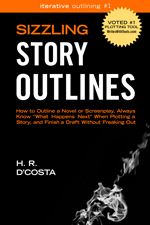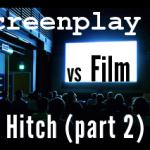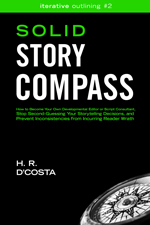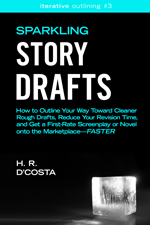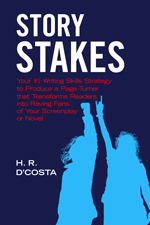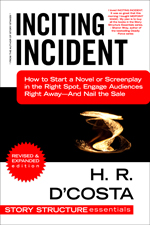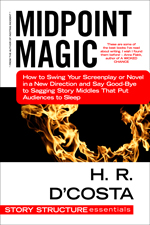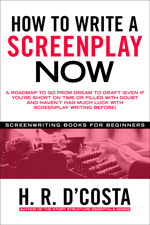What is exposition exactly? It’s just information. Usually details that your audience needs to understand a later plot development or an anecdote to explain your hero’s personality flaws.
Without the exposition, your reader would be confused about key moments in your script. So it’s an essential ingredient that you really need to master in order to write screenplays that sell.
The yellow writing at the beginning of the first Stars Wars movie is perhaps the most famous example of screenplay exposition.

The famous expository title crawl in STAR WARS
George Lucas got away with quite literally spelling out all the details of his fictional world in 1977, but you won’t be able to get away with that anymore. Your exposition will have to come out in dialogue, and unfortunately it isn’t easy. Done wrong, your expository dialogue will be clunky and boring…causing even the most forgiving reader to disengage from your script.
Fortunately, bad exposition is easy to identify. With a little bit of practice, you’ll be able to turn clunky exposition into dulcet dialogue. This post is to help you get started in the right direction by providing examples of exposition from the slow-burning thriller, The Tourist, starring Angelina Jolie and Johnny Depp.
The screenplay draft I found was first written by Julian Fellows (creator of Downton Abbey and Gosford Park), with revisions by William Wheeler and Jeffrey Nachmanoff…based on Jerome Salle’s Anthony Zimmer.
While well-written, the movie significantly improved upon the screenplay template, especially with respect to exposition. So in each of the examples below, you’ll see how the screenplay approached expository information and then how the movie handled it. Examining the differences should help you develop your own strategy for writing exposition.
To really learn from this post, I highly recommend you watch the movie first. Also, I’m including dialogue from the screenplay as much as possible, which makes this article rather long. You might want to print it first and read it later.
Exposition Example #1: The skinny on Alexander Pearce
Key Expository Information: Alexander owes the US government almost $750 million dollars in taxes.
Exposition in the screenplay: the information was presented through a security briefing at Interpol. Ackerman, the head of the investigation, gives a Power Point presentation which reveals details about Alexander’s childhood, his money laundering schemes, his theft from Russian crime lord Ivan Demidov…and the grotesque amount of taxes he owes to the government.
INT. INTERPOL CENTRAL BRIEFING ROOM, PARIS – EVENING
Behind the ornate, 17th century doors is a high-tech amphitheater style briefing room. All glass and steel.
Suited bureaucrats and officers from all over Europe listen to Ackerman as he leads the meeting from the podium.
ACKERMAN
Our target’s name is Alexander Pearce. British citizen, born in London into an ordinary middle class family. The only thing remarkable about his childhood was a preternatural gift for numbers.
Ackerman clicks a slide projected on a large screen behind him: a fuzzy photo of a British schoolboy with a shy grin.
ACKERMAN (CONT’D)
Which he used to hack into a computer and fix the test results his final year at school.
JEAN LUC (French Interpol liaison) looks up skeptically.
JEAN LUC
Your mastermind couldn’t pass his exams on his own?
ACKERMAN
He didn’t fix his test scores; he fixed the scores for all the girls in the class. It made him very popular.
A ripple of laughter through the group.
ACKERMAN (CONT’D)
(severely)
What started as school pranks eventually became something much more serious. After a year in the training program at Goldman Sachs, he decided that gambling suited him better than working for a living. That, in turn, involved him with some rather unsavory people and ultimately led him to put his financial genius to work in his true calling: money laundering.
QUINN is the Swiss Interpol liaison. He speaks with the crisp accent of a man who is fluent in several languages.
QUINN
You’ve assembled quite a task force to catch a common money launderer, Mr. Ackerman.
ACKERMAN
There is nothing common about Alexander Pearce. Quiet simply, he has turned money laundering into an art form. His greatest innovation: The False Lawsuit.
He clicks through a series of flashy Powerpoint slides illustrating Pearce’s financial dealings.
ACKERMAN (CONT’D)
Pearce sets up two companies: one is a Casino in Arizona for example and the other is a shell company in the Cayman Islands. The Cayman Islands company files a lawsuit against the casino, claiming copyright infringement or some other complaint. They “succeed” in winning the case and the casino pays the shell company an enormous settlement.
QUINN
(understanding)
The money travels from America to the Cayman Islands…
ACKERMAN
Yes, but now the money is legal.
JONES
Not quite legal. The I.R.S. has been cheated out of the revenue.
(beat)
We calculate that Mr. Pearce’s tax bill currently stands at $743.7 million dollars.
Jean Luc leans toward his colleague.
JEAN LUC
(whispers in French)
That explains what the American harridan is doing here.
Ms. Jones gives him a glacial stare.
JONES
Exactement, monsieur.
Jean Luc reddens. Oops. Apparently not every American fits the stereotype.
ACKERMAN
Mr. Pearce has some other debts as well. Most of you will recognize Ivan Demidov…
Click: A PHOTO of a balding RUSSIAN OLIGARCH emerging from a limo.
ACKERMAN (CONT’D)
…Pearce laundered over a billion dollars for Demidov. At some point Pearce decided he’d rather steal from Demidov than help him steal.
(beat)
Given Demidov’s ties to organized crime, I’d say that was a mistake.
JONES
(clears her throat)
The U.S. Government is not participating in an investigation of a member of the Russian parliament; our target is Alexander Pearce.
Ackerman smiles coolly at her.
ACKERMAN
Of course.
An INTERPOL OFFICER from Germany raises his hand.
GERMAN INTERPOL
Has Mr. Pearce ever been in custody?
Ackerman looks down for a moment, as if it pains him to answer.
ACKERMAN
Almost.
Exposition in the movie: Before I get to that, let me just mention that they made Alexander British in the movie, and he owes the British government an obscene amount of pounds. Second, Ackerman’s name is changed to Acheson…and he’s no longer the head of the unit investigating Alexander. That honor belongs to Chief Inspector Jones, played very handsomely by Timothy Dalton.
In the movie, Jones scolds Acheson for his inept handling of the investigation: “Alexander Pearce owes the government 744 million in illegal assets…which we might seize…this operation so far has cost me eight. If I thought there were more than a 1/100 chance you could be successful, it would be rational for me to continue this operation. But, I do not.”
This way of dispersing information about Alexander’s tax bill is better than the way it was done in the screenplay because you’re not just getting dry information (albeit intermixed with light doses of humor), you’re also learning about the supporting characters and their dynamic.
Because of his caustic dressing down of Acheson, Jones becomes a memorable figure of authority, which pays off later in the climax. Acheson also becomes the underdog, and you feel a little sorry for the guy who has a lot riding on this particular investigation. When the audience is focused on character dynamics instead of information, it’s usually a sign you’ve successfully presented the exposition in your screenplay!
Exposition Example #2: the sofa
Key Expository Information: okay, so this is pretty minor really…Elise and Frank share a suite at the luxurious Hotel Danieli, but they’ll be sleeping separately
Exposition in the screenplay: This was handled with a few lines.
EXT. BALCONY, DANIELI HOTEL – DAY
Frank stands on the balcony in a daze. He stares down at the Molo and across St. Mark’s Basin to San Georgio Maggiore. Cara joins him.
CARA
You like it?
Frank opens his mouth to answer. Then laughs.
FRANK
What’s not to like?
CARA
I’d have been bored here on my own. There’s more than enough room for two.
FRANK
I can see that.
CARA
I didn’t ask for an extra bed…
Frank looks at her for a beat, barely able to breathe.
CARA (CONT’D)
Are you all right with the sofa? If you like, I can have them bring one up?
His face falls. He tries to cover up his reaction.
FRANK
No, no, no. The sofa’s fine. Perfect in fact.
Before he can say more, the buzzer sounds.
This pretty succinctly addresses the issue of sleeping arrangements, but it could’ve been done even more succinctly…
Exposition in the movie: In the movie, this information was conveyed with barely a spoken word. After a lovely dinner together and a rather steamy kiss, Elise goes into the bedroom with these parting words, “I do hope the couch will be comfortable.” Frank follows her–and is greeted by a solid wooden door closing in his face.
If you can convey information with a bit of action instead of dialogue, opting for action is usually better. After dinner and the kiss, the audience is wondering “will they…or won’t they?” The door closing on Frank answers that question far better than any bit of dialogue could.
Exposition Example #3: Demidov’s involvement
Key Expository Information: Demidov desperately wants to track down Alexander
Exposition in the screenplay: this was done through two different scenes. Part of Alexander’s relationship with Demidov was explained in Ackerman’s Power Point presentation as described in Exposition Example #1. The rest was revealed through a conversation between Demidov and a double-crossing Swiss agent, Quinn.
EXT. PRIVATE LANDING STRIP, VENICE – DAY
A Gulfstream G550 executive jet banks over the Venetian coast and comes in for a landing…
Wheels down. Stairway unfolds. The man who steps off the plane is dressed in a hand-tailored Italian suit and shoes that cost more than some cars. He’s flanked by two bodyguards.
IVAN DEMIDOV. In the flesh.
EXT. VENICE – DAY
CAMERA floats over the rooftops toward the penthouse of a ultra-high end business hotel.
INT. DEMIDOV’S HOTEL ROOM – DAY
Demidov sips a glass of red wine. The view from his room rivals the one at the Danieli but Demidov pays no attention. He’s busy scanning his emails on his Blackberry.
Knock, knock. A thick-necked BODYGUARD in the background goes to answer the door. A moment later…
He ushers in Quinn, the Swiss Interpol agent.
DEMIDOV
Take a seat, Mr. Quinn. Can I offer you a glass of Brunello? It’s a ’97…
QUINN
No thank you, Mr. Demidov.
Demidov swirls his glass.
DEMIDOV
You know I’d never admit this at home, but Vodka is for peasants. There’s much we could learn from the Italians.
He smiles pleasantly at Quinn, then, on a dime, he turns back to business.
DEMIDOV (CONT’D)
Tell me I’m not going to be disappointed.
Quinn takes out an envelope and passes it over.
QUINN
I don’t think so.
He flips it open and examines the contents. WE GLIMPSE a photo of CARA and some text.
DEMIDOV
(to himself)
He always had good taste…
Demidov makes a gesture and a second BODYGUARD with a SCAR on his face gives Quinn an envelope filled with cash.
Quinn tucks it away discreetly, as if embarrassed by the directness of the pay off.
QUINN
Mr. Demidov… if I may ask you a question…Why do you care so much about Alexander Pearce? I mean, you’ve come here yourself…as if it were personal.
Demidov looks at Quinn thoughtfully.
DEMIDOV
It may be difficult for you to understand, Mr. Quinn; you Swiss are mercenary by nature. But for some of us, there are things more important than money. I put my trust in Alexander Pearce. He betrayed that trust.
Quinn smiles tightly. He’s ready to get out of there.
DEMIDOV (CONT’D)
And it’s bad business to let somebody make a fool of you. If Pearce gets away with it, what does that say about me?
Exposition in the movie: we don’t learn about Demidov’s involvement (renamed Reginald Shaw in the movie) through Ackerman. In fact, the first time we see him, we don’t know anything about him at all…just that this rather scary man in an expensive suit received information about Alexander from a mole–and ordered his private plane to change directions and head for Venice.
In one gesture, we know that Shaw is rich, powerful, ruthless, and that locating Alexander is his primary objective. We don’t know exactly why he’s after Alexander which increases the intrigue, keeping the audience in suspense. The movie also delays Shaw’s speech about Alexander’s cutting betrayal until the very end.
Exposition Example #4: the Italian police detective…and more on Demidov
Key Expository Information: Demidov/Shaw is after Alexander to reclaim the millions Alexander has stolen from him
Exposition in the screenplay: In the screenplay, the Italian police detective is named Domenico, and he’s a happy-go-lucky sort, not to mention a thorough detective. But his role doesn’t really add anything to the story (except the occasional bit of humor). His two key contributions are one, keeping Frank out of danger, at least temporarily, and two, cluing the audience about Demidov and why he’s after Frank.
INT. POLIZIA “QUESTURA” (POLICE STATION) – DAY
Frank sits alone with a blanket over his shoulders. Most of the blood has been wiped from his wound and he has a rough bandage on his head.
From down the hallway a cheery stubble-faced POLICE OFFICER, DOMENICO (30’s, animated), walks into the room where Frank is waiting.
Domenico laughs, talking on his cell phone as he enters.
DOMENICO
(in Italian)
You can’t let them stay over, man. You start cuddling and then she wants to borrow your car. Stop cuddling, Tomaso!
Frank stands.
FRANK
Excuse me…
DOMENICO
(suddenly noticing him)
Hey, what are you doing in here?
FRANK
The officers told me to wait here. I’ve been sitting here for over two hours…
Domenico glances over his shoulder.
DOMENICO
I think they forgot about you.
Frank sits back down heavily. Domenico sits on the edge of a desk.
DOMENICO (CONT’D)
What happened to you, anyway?
FRANK
Somebody tried to kill me.
Domenico picks up Frank’s statement and glances at it.
DOMENICO
Mr. Taylor, wow, you had quite a day. Eh? We got chasing, we got shooting.
Domenico looks at mild-mannered Frank sitting there in his boxers. The story seems unlikely.
FRANK
You think I’m crazy but it’s all true.
DOMENICO
Maybe you crazy AND it’s true, my friend.
Domenico looks at Frank a little harder. Decides this guy is not making all this up.
DOMENICO (CONT’D)
Okay, so who are these guys? Why they mad at you?
FRANK
I have absolutely no idea.
DOMENICO
They followed you from the Danieli?
FRANK
They came to the room. They pretended to be room service.
DOMENICO
You don’t scopata one of their girlfriends or something?
FRANK
I didn’t “scopata” anybody!
DOMENICO
Who is…
He consults a piece of paper.
DOMENICO (CONT’D)
Cara Mason?
Frank is quiet. Domenico playfully points at him.
DOMENICO (CONT’D)
I catch you, right?
FRANK
(irritated)
In America the cops catch the crooks, not the victim.
DOMENICO
Ha ha, we do that sometimes here, too.
Domenico considers for a moment.
DOMENICO (CONT’D)
Is no domestic, then?
FRANK
No.
DOMENICO
How long you know Cara Mason?
FRANK
I met her yesterday.
DOMENICO
And you take her to the Danieli? That must have been good meeting, yes?
FRANK
I didn’t take her. She took me.
The infectious grin again lights up Domenico’s face.
DOMENICO
You lead an exciting life, Mr. Taylor.
FRANK
Not usually.
Domenico picks up the phone and dials a number. He talks in brisk Italian, listens again and replaces the receiver.
DOMENICO
Signora Mason was staying with “her husband” last night. You marry her, Mr. Taylor?
FRANK
No.
DOMENICO
I think maybe Signora Mason might know why these guys behave badly. What do you think?
Pause.
FRANK
I think that’s possible.
DOMENICO
You got a phone number, mobile?
FRANK
She didn’t give me one.
Domenico looks him over.
DOMENICO
You need some clothes. I’ll be right back.
He leaves Frank alone again.
Frank stands and half-heartedly follows him to the doorway.
He spots something in the adjoining room; a computer that has been left on. He wanders over and looks at the screen.
An idea comes into Frank’s head… he looks around. Nobody is watching him. He glances at the inscription on the WATCH…
Then quickly sits down. He does a search for “WANTED INTERNATIONAL CRIMINALS” and types in the name:
ALEXANDER PEARCE.
An immediate hit in the data base. Alexander Pearce’s page fills the screen. The caption reads:
#6 on INTERPOL’S MOST WANTED LIST.
In place of a photograph there is just a black outline of a man’s head.
Frank is about to scan for more information when he hears Domenico returning. He quickly steps back into the room where he was left…
DOMENICO enters carrying a garish SWEAT SUIT. He hands it to Frank.
DOMENICO (CONT’D)
Here. Put these on. Time to go.
Frank looks at the clothes.
FRANK
Um…thanks. Where are we going?
DOMENICO
I’m taking you to the hospital, Mr. Taylor. A doctor should take a look at you.
FRANK
I’d really rather just go–
DOMENICO
Don’t worry. I put you in Padua, away from Venice. You’ll be safe.
(scribbles his number)
Any worry, you call me. I give you my home number.
Exposition in the movie: the Italian police detective plays a similar role in the movie. He gets Frank out of danger–temporarily–and he provides key information about Demidov (now renamed Shaw). Shaw and his gangsters have come to Venice to find Alexander, and there’s a bounty on his head. (There’s also a bit of business about cigarettes which is a setup which pays off during the climax.)
While the movie dispensed with a lot of unnecessary dialogue, there’s still some. Frank rehashes information that we all already know: he wants to report an attempted murder on himself, he got involved because he met a beautiful woman on a train who took him to a hotel…and bad people are trying to kill Frank because of her.
Okay, this is all well and good for the detective to hear–but we don’t need to.
The scene itself in the movie doesn’t drag too much thanks to the actors who spice it up with a bit of humor about American tourists. But you can’t bank on Johnny Depp delivering your exposition, so your screenplay shouldn’t repeat information that’s already been conveyed to the audience. If your screenplay is too long but you can’t see a way to cut pages, look for repeat information.
Cut that information out and begin the scene by making it clear that your characters have just gone over that info, although we, the audience, thankfully didn’t have to witness that dialogue. Then go into the new development that really is the purpose of this scene.
In The Tourist, this would be accomplished by starting the scene with the detective saying something like this to Frank, “your story is preposterous. Still, it’s more interesting than my stack of unfinished paperwork, so I will check it out.”
Boom!
You’ve conveyed that Frank and the detective have spoken (which is a prerequisite for later developments in the story), but you haven’t bored the audience by repeating what they already know.
Exposition Example #5: how Elise got involved with Alexander (Spoiler Alert!)
Key Expository Information: Elise got to know Alexander because it was part of her job as a Financial Crimes officer
Exposition in the screenplay: This is more than just exposition, it’s a neat plot twist. From the beginning, we’ve been led to believe that Elise was just a beautiful woman caught in Alexander’s web, but with this key bit of information, we learn that she intended to be there as part of a long-term undercover operation.
In the screenplay, the information is revealed through a picture. Ackerman shows Frank a photo from the CID Academy, Class of 2002. Surprise, surprise, Elise is one of those graduates.
INT. INTERPOL FIELD HQ, VENICE – DAY
Ackerman leads Frank through the maze of desks and police. Various members of the task force follow their progress…Jean Luc, Jones, etc.
They arrive at a central INTEL area where Goyal sits in front of several computer monitors.
He looks up as Ackerman and Frank arrive.
ACKERMAN
(to Goyal)
Pull up the CID Academy graduating class for 2002.
Goyal raises an eyebrow, but does as he’s told. A few moments later a photo of POLICE RECRUITS in uniform comes up on screen.
ACKERMAN (CONT’D)
Take a good look.
Frank peers at the screen. He spots the instructor–Ackerman seven years younger.
FRANK
You?
ACKERMAN
Take a look at the second row.
INSERT CLOSE UP on the screen.
Frank examines the second row. One of the young women is…CARA MASON. Her hair is pulled back. She looks more the determined police cadet than the sexy siren…but it’s definitely her.
FRANK
Cara…
He is dumbfounded.
ACKERMAN
We’ve been watching you this entire time.
FRANK
(dawning)
You saw those men try to kill me and you didn’t intervene?
ACKERMAN
I’m trying to apprehend a major criminal. I’m not a babysitter.
Frank grows angry.
FRANK
I want to speak with somebody at the American Embassy. I’m going to tell them that you and your undercover officer knowingly and recklessly endangered the life of an American citizen! Let’s see what my government has to say about that!
Jones clears her throat from a chair across the room.
JONES
We’re aware of the situation, Mr. Taylor. But we take a long view of these things… fortunately you are unhurt…
Frank is incredulous.
FRANK
Then I’ll go to the press. I’ll tell the entire story to the New York Times.
ACKERMAN
(quietly)
No. I don’t think you’ll do that.
FRANK
Why not?
ACKERMAN
Because I don’t think you want to see Cara’s entire career destroyed.
Frank falls silent. Ackerman puts an arm around his shoulder and leads him away from the others.
ACKERMAN (CONT’D)
Espresso?
EXT. INTERPOL FIELD HQ, VENICE – DAY
Frank stands on a balcony overlooking a waterway. Ackerman emerges with two cups of espresso. Hands one to Frank.
ACKERMAN
Women like Cara don’t come along very often.
FRANK
In my case, they don’t come along at all.
ACKERMAN
She’s the worst combination: stunning looks and a brilliant mind.
FRANK
If she’s so smart, how did she get caught up with Pearce?
ACKERMAN
It started out as a straightforward placement…
INT. DOGE’S PALACE – DAY [FLASHBACK]
Cara (younger) poses as an art student, sketching a SCULPTURE in the Anticollegio.
ACKERMAN (V.O.)
…we ran her deep cover to build a case against Pearce. It took. He hired her as an assistant.
She turns her face and smiles at an UNSEEN MAN.
EXT. YACHT – DAY [FLASHBACK]
The wind blows in Cara’s hair. She sits on the top deck. A MAN’S HAND passes her a drink as he walks by. She smiles at him (again we do not see his face).
ACKERMAN (V.O.)
Then she began missing drops. Omitting important details.
EXT. BALCONY – RESUME SCENE
Ackerman turns to Frank.
ACKERMAN
She was no longer with us. She was with him.
Ackerman finishes his espresso.
ACKERMAN (CONT’D)
She explains it now as the confusion of her new life outside the academy. That I misread her capacity for this kind of work.
FRANK
Then why are you still using her?
ACKERMAN
She’s all I have, Mr. Taylor.
Beat.
FRANK
You think she’ll turn him in this time?
ACKERMAN
I don’t know.
Goyal walks up behind Ackerman waiting patiently for a moment to interrupt him.
ACKERMAN (CONT’D)
I do know however, that you are very smitten with her.
Frank looks back at him evenly.
FRANK
It’s not just me, is it?
Ackerman acknowledges the point with the barest of nods.
Exposition in the movie: the movie handled this exposition much more economically. First, Elise storms into the Financial Crimes temp HQ in Venice and gives the officer guarding the entrance her ID number. When she enters Acheson’s office, he greets her by saying, “you’ve certainly blown your cover now,” to which she responds she’s ready to give Alexander up.
Acheson answers with perfect British understatement, “you’ve lived with him for an entire year…during that time you haven’t provided one usable photograph…and now you’re ready to give Alexander up? It’s because of that tourist isn’t it? I wish I could understand your taste in men…a schoolteacher…who would’ve thought your tastes were so provincial?”
And with those brief lines, we gain a range of knowledge. We know Elise was an undercover agent. We know she didn’t fulfill her job responsibilities because her loyalties became conflicted, and with that knowledge, we also know her emotional entanglement with Alexander started very early. We also learn that Alexander isn’t the only one–she cares for Frank as well…and despite his desperate obsession, she will never feel that way towards Acheson.
Pretty heady stuff…and all with a few lines of well-written dialogue.
